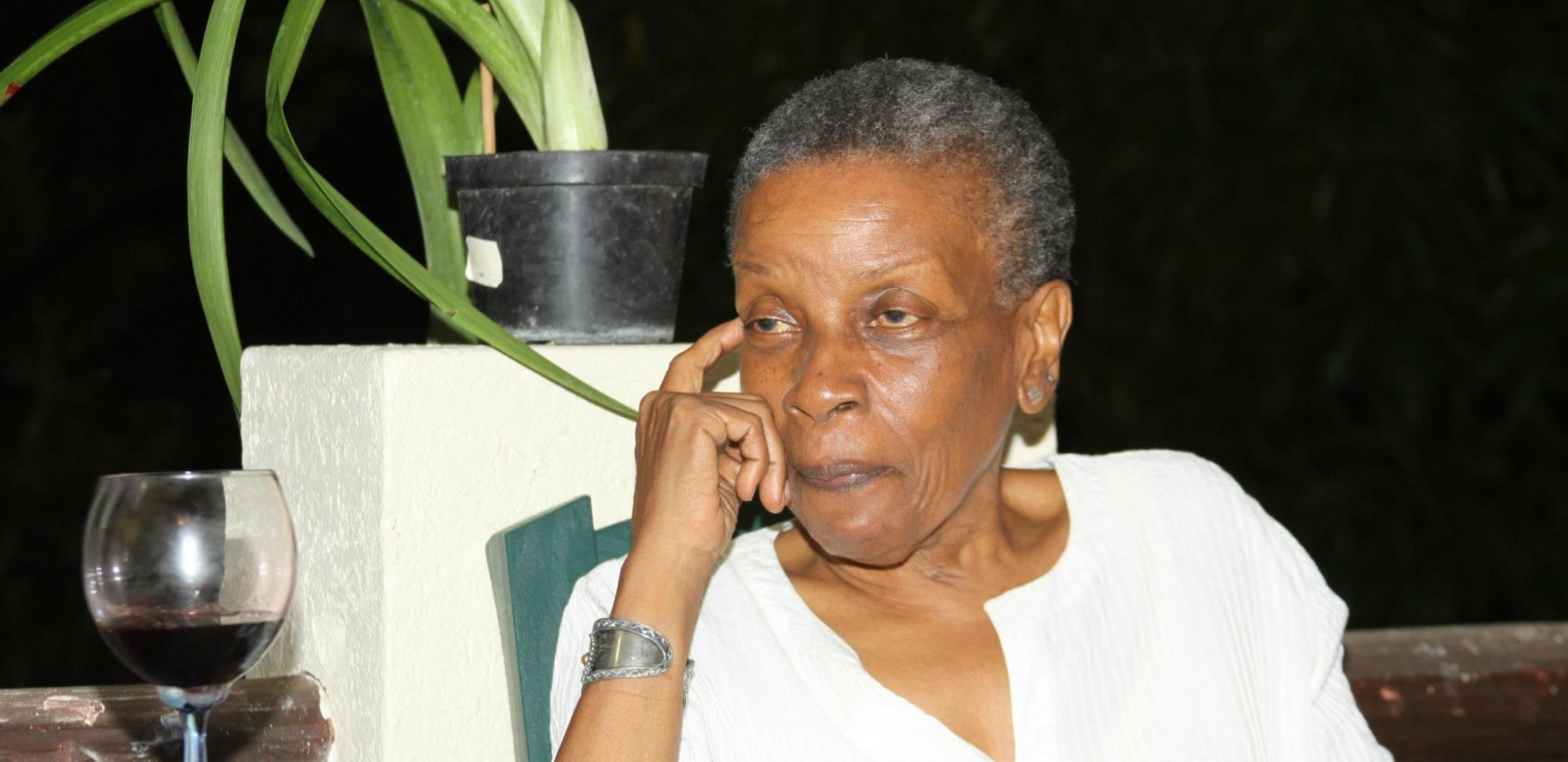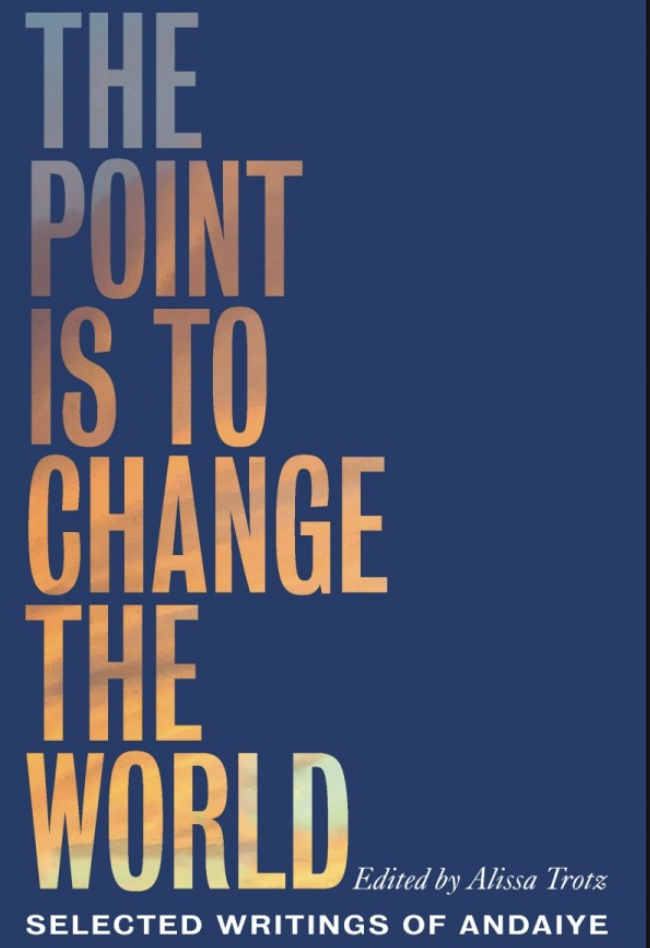Andaiye. 2020. The Point is to Change the World. London: Pluto Books
“I’m not saying this to be pessimistic. I’m saying it to say that we all know that if we want to change people we have to start from where they are.” Andaiye, October 24, 2018
Andaiye has been such an amazing force for social justice, both at home and abroad. She showed us how to make life meaningful by her own determination to make every moment count. She leads that generation that Martin Carter so aptly described, who did not sleep to dream but dreamed to change the world.
Asha Kambon, Trinidad and Tobago
We have chosen a bio for this page because it is one that Andaiye herself had seen. The file itself referred to a “Joanne” but it is not clear if this is the person who wrote it. As soon as we confirm who wrote this, we will credit them on this site.
This was what Andaiye said about it:
“I can’t remember who wrote it; I know I didn’t since I wouldn’t refer to myself as a transformative figure. Still, it is probably the most complete bio of me and factually, is almost accurate. The only 2 things that sprang out at me were (1) the reference to my supporting the civil rights and anti-apartheid movements while I lived in the US – I remember also supporting liberation movements in Central America and the Black Power movement; and (2) I’m no longer active in the Global Women’s Strike, nor is Red Thread, although I remain in close touch with Selma James and other leaders of the Strike. In fact as you know, I’m not able to be active now except in exchanging ideas and making statements with others on various issues.” (Andaiye, April 7, 2019)
Andaiye
An organizer against injustice for most of her adult life, Andaiye has written about growing up in the inequalities of nation, race/ethnicity, class and sex and how this experience shaped her politics. Born on September 11, 1942, in Georgetown, British Guiana (Guyana[1]), she was originally named Sandra Williams but during the 1970s Black Power rebellion in the region, changed her name to Andaiye, meaning ‘a daughter comes home’. She attended The Bishop’s High School and from 1961-64, the University College of the West Indies (UCWI) at Mona, completing a Bachelor of Arts honors degree in French and Spanish and serving as Secretary of the Guyana Society. Deciding against an academic career she returned to Guyana in 1965 to prepare to join Guyana’s diplomatic service at Independence in 1966, but a brief diplomatic training course led her to change course to education. It was during this period that she engaged in discussions with progressive Caribbean thinkers of the New World Group (NWG) which,formed in the early 1960s, included personalities such as Lloyd Best of Trinidad and Tobago, George Beckford of Jamaica, and David de Caires, Miles Fitzpatrick and Clive Thomas of Guyana; and in Ratoon, formed by lecturers at the University of Guyana (UG) and individuals including Bonita Harris and Pansy Benn. Andaiye later joined the Movement Against Oppression (MAO), another political pressure group which drew members from UG, political parties, Ratoon and the working class community of Tiger Bay. (Nettles 2008, 48; Westmaas 2004, 67-70; Women’s Affairs Bureau [Guyana] 1997, 163; Caribbean Reasonings Conference 2010; Andaiye 2000, 53 and Girvan 2007).
From 1967- 1970 Andaiye taught at the Charlestown Government Secondary School in Guyana, soon promoted to Senior Mistress and then appointed Acting Principal of the South Georgetown Secondary School at age 28; this was part of an experiment by then Minister of Education Shirley Field-Ridley to see whether younger women and men in the leadership of schools could break traditional patterns of teaching and administering discipline. After one year she was forced out due to her involvement with MAO and her contribution to one of its publications which incensed the then government. She then moved to New York, USA where she lectured at the SEEK (Search for Education and Elevation through Knowledge) program at the City University of New York, Queens College from 1972-1977 and while there, engaged in political actions in support of civil rights in the USA and against apartheid in South Africa (Women’s Affairs Bureau [Guyana] 1997, 163; Andaiye 2000, 53 and Nettles 2004, 52).
Guyanese politics had been divided on the basis of race/ethnicity with the breakup of the nationalist movement in the 1950s and since 1968, the country had been under the dictatorial rule of the People’s National Congress (PNC) led by Forbes Burnham. In early 1978 Andaiye returned home to join the multi-racial pre-party Working People’s Alliance (WPA), formed as a movement of opposition to the PNC; its leadership then included Eusi Kwayana, Moses Bhagwan, Bonita Harris, Joshua Ramsammy, Clive Thomas, Tacuma Ogunseye and Walter Rodney. Along with Rupert Roopnaraine, who returned at about the same time that she did, she was quickly elected to the executive of the group and worked full-time as WPA Coordinator and Editor of the Dayclean newssheet through the politically turbulent period from 1978 to June 1980, when Walter Rodney was assassinated. Subsequently, she became first International Secretary and then Women’s Secretary of the WPA. During 1980-1983 she was part of the Caribbean left which coalesced around the Grenada revolution (Scott 2004, passim; Westmaas 2004, 63-81 passim).
Since the mid-1980s Andaiye has been primarily an activist and organizer with women nationally, regionally and internationally. In 1986, along with six other women (Bonita Harris, Karen de Souza, Vanda Radzik, Danuta Radzik, Diane Matthews and Jocelyn Dow), she formed Red Thread – a politically independent women’s network which began primarily as an income generating avenue for women but always had the underlying aim of bringing women together across Guyana’s race divides. By 1992/1993 this phase came to an end because, as Andaiye noted, it was not economically sustainable. A new stage in Red Thread emerged, which focused principally on research and advocacy on violence against women, women’s reproductive health and counting women’s work. Andaiye was integral to the advocacy for, and participation of Guyana in the Global Women’s Strike (GWS), which had been formed by the International Wages for Housework Campaign (Andaiye 2000, 53-96; Kempadoo 2013, 1-7; Trotz 2004, 12-17; Nettles 2004, 54 and Scott 2004, 199-214). For her outstanding and dedicated work with women, in 1997 Andaiye was awarded the Guyana Golden Arrow of Achievement (Women’s Affairs Bureau [Guyana] 1997; Jamaican Observer March 11, 2002 and Stabroek News May 26, 1997).
Andaiye’s work goes beyond the WPA (which she left in the mid 1990s) and Red Thread. A cancer survivor, she was a founding member and Acting President of the Guyana Cancer Society. She also served on the executive of the Caribbean Association for Feminist Research and Action (CAFRA), as a Director of Help and Shelter, as Board Member of the Guyana National Commission on Women, and as a member of the International Women Count Network.
Since all her political work was unpaid, Andaiye took on consultancies but ensured that where possible, they contributed to the goals of her political organizing. Between 1987 and 1993 she worked on theory-building with the Women and Development Unit (WAND) at the University of the West Indies (UWI). She then served as one of the Caribbean Community’s (CARICOM) resource persons for the United Nations Fourth World Conference on Women in 1995, and in 1996, was briefly a Special Adviser to the Secretary-General of CARICOM on Women and Gender and prepared the CARICOM Post-Beijing Regional Plan of Action.
Andaiye has presented at numerous regional and international fora; for example, she delivered the keynote address at the 24th Annual Third World Conference in Chicago in 1998, and gave the Lucille Mathurin Mair Lecture in Jamaica in 2002 and the Patrick Emmanuel Memorial Lecture in Barbados in 2009. She also participated in a North American speaking tour in 2012 with Selma James, founder of the Global Women’s Strike.
Andaiye has written extensively on the issues of women’s development and the politics of Guyana and the Caribbean. Her work, featured in peer reviewed journals and as book chapters, includes “The Historic Centrality of Mr. Slime: Lamming’s Pursuit of Class Betrayal in Novels and Speeches”; “The Red Thread Story: Resisting the Narrow Interests of a Broader Political Struggle”; “Women and Poverty in Guyana”; “The Angle You Look From Determines What You See: Towards a Critique of Feminist Politics in the Caribbean”; “Democracy and Development: The Case of Guyana”; “The Valuing of Women’s Unwaged Work”; and “Towards A Vision of the Future: Gender Issues in Regional Integration”. Additionally, between 1997 and 2000 she produced a weekly newspaper column featured in the Stabroek News (Guyana) titled the “Woman’s Eye-view.” She served on the International Editing Committee for the NGO Forum Plan of Action for Beijing, as the Editor of the WAND Occasional Papers (1988-1991) and special issues focused on “Caribbean Women Organising” for three years (1997-2000), and also edited Walter Rodney’s last work, including A History of the Guyanese Working People, 1881-1905 and two children’s books, Kofi Baadu Out of Africa and Lakshmi Out of India.
Andaiye has been a transformative figure throughout her life, from her years of teaching in Guyana to her work with the WPA, the Caribbean Community, at the Red Thread Women’s Organisation and at international fora. She lives in Georgetown, Guyana and continues in her organizing for social transformation. (Andaiye 2000, 53-96; Jamaican Observer March 11, 2002 and Women’s Affairs Bureau [Guyana] 1997, 16).
Note: In April 2019, Andaiye completed editing a collection of her writings over 50 years of activism and was in conversation with a publisher.
The anthology, titled The Point is to Change the World, was published in April by Pluto Press: Black Critique Series, 2020. It will be published by Between the Lines in Canada. All royalties from the sale of the book go to Red Thread in Guyana, the grassroots women’s organisation she co-founded in 1986.
Bibliography
Books and Book Chapters
Andaiye. 2020. The Point is to Change the World. London: Pluto Books.
Andaiye. 1995. Democracy and Development: The Case of Guyana. St. Michael, Barbados: Women and Development Unit, University of the West Indies.
_______. 2002. The Angle You Look From Determines What You See: Towards a Critique of Feminist Politics in the Caribbean. Mona, Jamaica: Centre for Gender and Development Studies.
_______. 2000. “The Red Thread Story: Resisting the Narrow Interests of a Broader Political Struggle” In Spitting in the Wind: Lessons in Empowerment from the Caribbean. Ed. Suzanne Francis Brown. Kingston: Ian Randle Publishers.
_______. 1994. The Valuing of Women’s Unwaged Work. St. Michael, Barbados: Women and Development Unit, University of the West Indies.
_______. 1993. “Women and Poverty in Guyana” In Poverty in Guyana: Finding Solutions. Ed. Institute of Development Studies. Guyana: Institute of Development Studies, University of Guyana, 1993. 35 – 51.
Andaiye and Peggy Antrobus. 1991. Towards a Vision of the Future: Gender Issues in Regional Integration. St. Michael, Barbados: Women and Development Unit, School of Continuing Studies, University of the West Indies.
Antrobus, Peggy. 2004. The Global Women’s Movement: Origins, Issues and Strategies. London: Zed.
Caribbean Reasonings Conference, Brian Meeks, and Norman Girvan. 2010. The Thought of New World: The Quest for Decolonisation. Kingston, Jamaica: Ian Randle.
Nettles, Kimberly D. 2008. Guyana Diaries: Women’s Lives Across Difference. Walnut Creek, Calif: Left Coast Press.
Women’s Affairs Bureau (Guyana). 1997. Guyanese Women in Focus. Georgetown,
Guyana: H. Halley-Burnett.
[1] British Guiana was renamed Guyana after they gained independence on May 26, 1966.

